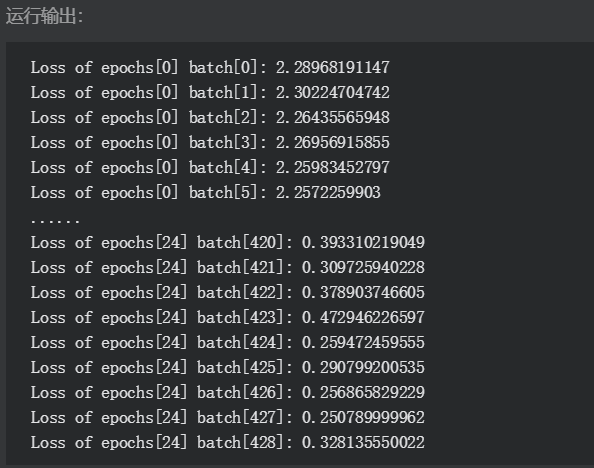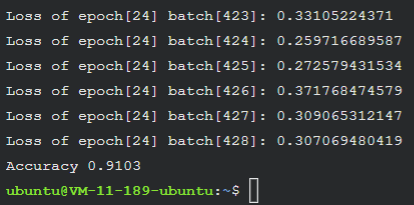tencent_2.2_logistic_regression
课程地址:https://cloud.tencent.com/developer/labs/lab/10296/console
首先我们需要先下载MNIST的数据集。使用以下的命令进行下载:
wget https://devlab-1251520893.cos.ap-guangzhou.myqcloud.com/t10k-images-idx3-ubyte.gz wget https://devlab-1251520893.cos.ap-guangzhou.myqcloud.com/t10k-labels-idx1-ubyte.gz wget https://devlab-1251520893.cos.ap-guangzhou.myqcloud.com/train-images-idx3-ubyte.gz wget https://devlab-1251520893.cos.ap-guangzhou.myqcloud.com/train-labels-idx1-ubyte.gz
logistic_regression.py
#-*- coding:utf-8 -*- import time import numpy as np import tensorflow as tf from tensorflow.examples.tutorials.mnist import input_data MNIST = input_data.read_data_sets("./", one_hot=True) learning_rate = 0.01 batch_size = 128 n_epochs = 25 X = tf.placeholder(tf.float32, [batch_size, 784]) Y = tf.placeholder(tf.float32, [batch_size, 10]) w = tf.Variable(tf.random_normal(shape=[784,10], stddev=0.01), name="weights") b = tf.Variable(tf.zeros([1, 10]), name="bias") logits = tf.matmul(X, w) + b entropy = tf.nn.softmax_cross_entropy_with_logits(labels=Y, logits=logits) loss = tf.reduce_mean(entropy) optimizer = tf.train.GradientDescentOptimizer(learning_rate=learning_rate).minimize(loss) init = tf.global_variables_initializer() with tf.Session() as sess: sess.run(init) n_batches = int(MNIST.train.num_examples/batch_size) for i in range(n_epochs): for j in range(n_batches): X_batch, Y_batch = MNIST.train.next_batch(batch_size) _, loss_ = sess.run([optimizer, loss], feed_dict={ X: X_batch, Y: Y_batch}) print "Loss of epochs[{0}] batch[{1}]: {2}".format(i, j, loss_)

修改logistic_regression.py,增加测试准确率功能
#-*- coding:utf-8 -*- import numpy as np import tensorflow as tf from tensorflow.examples.tutorials.mnist import input_data MNIST = input_data.read_data_sets("./", one_hot=True) learning_rate = 0.01 batch_size = 128 n_epochs = 25 X = tf.placeholder(tf.float32, [batch_size, 784]) Y = tf.placeholder(tf.float32, [batch_size, 10]) w = tf.Variable(tf.random_normal(shape=[784,10], stddev=0.01), name="weights") b = tf.Variable(tf.zeros([1, 10]), name="bias") logits = tf.matmul(X, w) + b entropy = tf.nn.softmax_cross_entropy_with_logits(labels=Y, logits=logits) loss = tf.reduce_mean(entropy) optimizer = tf.train.GradientDescentOptimizer(learning_rate=learning_rate).minimize(loss) init = tf.global_variables_initializer() with tf.Session() as sess: sess.run(init) n_batches = int(MNIST.train.num_examples/batch_size) for i in range(n_epochs): for j in range(n_batches): X_batch, Y_batch = MNIST.train.next_batch(batch_size) _, loss_ = sess.run([optimizer, loss], feed_dict={ X: X_batch, Y: Y_batch}) print "Loss of epochs[{0}] batch[{1}]: {2}".format(i, j, loss_) n_batches = int(MNIST.test.num_examples/batch_size) total_correct_preds = 0 for i in range(n_batches): X_batch, Y_batch = MNIST.test.next_batch(batch_size) preds = tf.nn.softmax(tf.matmul(X_batch, w) + b) correct_preds = tf.equal(tf.argmax(preds, 1), tf.argmax(Y_batch, 1)) accuracy = tf.reduce_sum(tf.cast(correct_preds, tf.float32)) total_correct_preds += sess.run(accuracy) print "Accuracy {0}".format(total_correct_preds/MNIST.test.num_examples)





 浙公网安备 33010602011771号
浙公网安备 33010602011771号